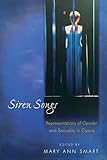Siren Songs : Representations of Gender and Sexuality in Opera / ed. by Mary Ann Smart.
Material type: TextSeries: Princeton Studies in Opera ; 34Publisher: Princeton, NJ : Princeton University Press, [2014]Copyright date: ©2001Description: 1 online resource (288 p.) : 32 illus, 7 halftonesContent type:
TextSeries: Princeton Studies in Opera ; 34Publisher: Princeton, NJ : Princeton University Press, [2014]Copyright date: ©2001Description: 1 online resource (288 p.) : 32 illus, 7 halftonesContent type: - 9780691058139
- 9781400866717
- 782.1
- online - DeGruyter
- Issued also in print.
| Item type | Current library | Call number | URL | Status | Notes | Barcode | |
|---|---|---|---|---|---|---|---|
 eBook
eBook
|
Biblioteca "Angelicum" Pont. Univ. S.Tommaso d'Aquino Nuvola online | online - DeGruyter (Browse shelf(Opens below)) | Online access | Not for loan (Accesso limitato) | Accesso per gli utenti autorizzati / Access for authorized users | (dgr)9781400866717 |
Frontmatter -- Contents -- Acknowledgments -- Introduction -- Through Voices, History -- The Absent Mother in Opera Seria -- Staging Mozart's Women -- The Career of Cherubino, or the Trouser Role Grows Up -- Elisabeth's Last Act -- Body and Voice in Melodrama and Opera -- Ulterior Motives: Verdi's Recurring Themes Revisited -- Melisande's Hair, or the Trouble in Allemande: A Postmodern Allegory at the Opera-Comique -- Opera: Two or Three Things I Know about Her -- Staging the Female Body: Richard Strauss's Salome -- "Soulless Machines" and Steppenwolves: Renegotiating Masculinity in Krenek's Jonny spielt auf -- "Grimes Is at His Exercise": Sex, Politics, and Violence in the Librettos of Peter Grimes -- Notes -- Index
restricted access online access with authorization star
http://purl.org/coar/access_right/c_16ec
It has long been argued that opera is all about sex. Siren Songs is the first collection of articles devoted to exploring the impact of this sexual obsession, and of the power relations that come with it, on the music, words, and staging of opera. Here a distinguished and diverse group of musicologists, literary critics, and feminist scholars address a wide range of fascinating topics--from Salome's striptease to hysteria to jazz and gender--in Italian, English, German, and French operas from the eighteenth to the twentieth centuries. The authors combine readings of specific scenes with efforts to situate these musical moments within richly and precisely observed historical contexts. Challenging both formalist categories of musical analysis and the rhetoric that traditionally pits a male composer against the female characters he creates, many of the articles work toward inventing a language for the study of gender and opera. The collection opens with Mary Ann Smart's introduction, which provides an engaging reflection on the state of gender topics in operatic criticism and musicology. It then moves on to a foundational essay on the complex relationships between opera and history by the renowned philosopher and novelist Catherine Clément, a pioneer of feminist opera criticism. Other articles examine the evolution of the "trouser role" as it evolved in the lesbian subculture of fin-de-siècle Paris, the phenomenon of opera seria's "absent mother" as a manifestation of attitudes to the family under absolutism, the invention of a "hystericized voice" in Verdi's Don Carlos, and a collaborative discussion of the staging problems posed by the gender politics of Mozart's operas. The contributors are Wye Jamison Allanboork, Joseph Auner, Katherine Bergeron, Philip Brett, Peter Brooks, Catherine Clement, Martha Feldman, Heather Hadlock, Mary Hunter, Linda Hutcheon and Michael Hutcheon, M.D., Lawrence Kramer, Roger Parker, Mary Ann Smart, and Gretchen Wheelock.
Issued also in print.
Mode of access: Internet via World Wide Web.
In English.
Description based on online resource; title from PDF title page (publisher's Web site, viewed 29. Jul 2021)


